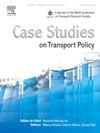Exploring mobile phone use behavior among electric bicycle food delivery riders: an extended theory of planned behavior approach
IF 3.3
Q3 TRANSPORTATION
引用次数: 0
Abstract
This study aims to explore the underlying causes and influencing factors of mobile phone use behavior among electric bicycle food delivery riders during rides. Based on the extended Theory of Planned Behavior (TPB), this research constructs a structural equation model (SEM) that incorporates latent variables such as attitude, subjective norm, perceived behavioral control, traffic environment perception, delivery environment perception, and salary expectation. Data were collected through a questionnaire survey of 121 electric bicycle food delivery riders in Chaoyang District, Beijing, primarily males aged 31–40. Statistical analysis was conducted using SPSS (Version 27) and AMOS (Version 24). The results indicate that attitude and subjective norm have a significant negative impact on riders’ behavioral intentions to use mobile phones, while perceived behavioral control and traffic environment perception exert a significant positive impact on behavioral intention. Additionally, both behavioral intention and perceived behavioral control have a significant positive influence on actual behavior. The study concludes that enhancing safety awareness education and optimizing infrastructure for non-motorized vehicles can effectively reduce the hazardous behavior of mobile phone use during rides, thereby improving the traffic safety of riders.
研究电动自行车送餐员的手机使用行为:一个扩展的计划行为方法理论
本研究旨在探讨电动自行车外卖骑手在骑行过程中手机使用行为的深层原因及影响因素。本研究基于扩展的计划行为理论(TPB),构建了一个包含态度、主观规范、感知行为控制、交通环境感知、配送环境感知和薪酬期望等潜在变量的结构方程模型(SEM)。数据通过问卷调查的方式收集,调查对象为北京市朝阳区121名电动自行车外卖骑手,主要为31-40岁的男性。采用SPSS (Version 27)和AMOS (Version 24)进行统计分析。结果表明,态度和主观规范对乘客使用手机的行为意愿具有显著的负向影响,而感知行为控制和交通环境感知对行为意愿具有显著的正向影响。行为意向和感知行为控制对实际行为均有显著的正向影响。研究认为,加强安全意识教育和优化非机动车辆基础设施可以有效减少乘车过程中使用手机的危险行为,从而提高乘车者的交通安全。
本文章由计算机程序翻译,如有差异,请以英文原文为准。
求助全文
约1分钟内获得全文
求助全文

 求助内容:
求助内容: 应助结果提醒方式:
应助结果提醒方式:


